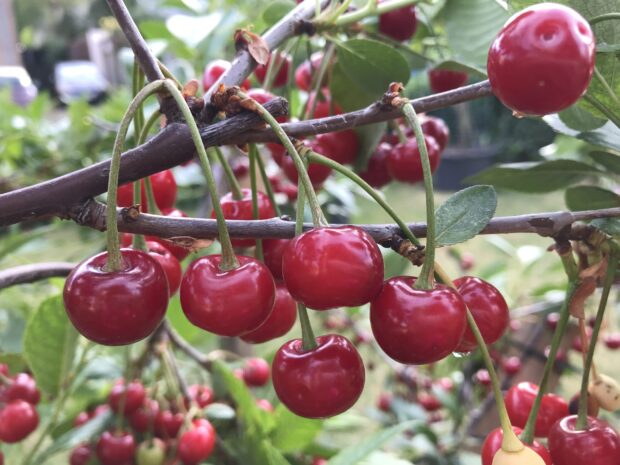The Cherry Fruitfly affects cherries and other soft-bodied fruits such as California berries. Numerous gardeners have complained that small little white worms are found in cherries right at the time of the harvest. These worms are the maggots of a fruit fly that has been a parasite in Japan for decades but somehow has come to the United States. It has no known enemies in the U.S., so it spreads unhindered like a fire. This parasite has appeared in raspberries, strawberries, and blueberries, but especially in cherries.
Reasonable control can be achieved with a few well-timed sprays of pesticides, which begin when the earliest maturing variety in the garden is just starting to turn from green to straw.
Fungicide for cherry trees
The cherry tree can develop fungal diseases such as leaf blight, powdery mildew, or root rot. This can cause blackening or mottling of the leaves, fuzzy white spots on the leaves, or the gradual death of branches and branches. These diseases develop in humid conditions and are best prevented by planting the tree in an area with good air circulation, where the soil is well-drained and does not stay damp after rain. To avoid fungal problems, water the tree at the roots with a water hose, or use drip irrigation and avoid wetting the foliage. If you see blackened leaves or young twigs, prune them to prevent the spread of the disease by rubbing alcohol between the cuts.
You can also use fungicides to cure the fungal disease further. Some of the registered fungicides are the new SDHI Luna Sensation and Merivon premixes and the strobilurin Gem fungicide. Luna Sensation and Merivon entirely control cherry leaf stain and powdery mildew.

Organic cherry tree spray
Growing your fruit can be healthy and delicious. Fruit trees, from apples to peaches, cherries to lemons, can be susceptible to various insect pests, which can reduce the quality of the fruit and the health of the entire tree. But you can protect your fruit trees from insects with homemade organic pesticides.
For the organic and homemade cherry spray, you can use vegetable oil, cinnamon oil, hot peppers, garlic, and liquid dish detergent. All of these ingredients are mixed gently. For application, you will need to use a pesticide spray made specifically for the trees. The liquid should be visible on the leaves, but not drip. You should wear gloves and goggles to prevents the excessive mixture from getting into the eyes or on the skin.
Cherry fruit fly organic control
The beetle, often referred to as the “cherry fruit fly,” is a tiny fly that lays its eggs on ripening cherries. This usually occurs in the end of the month of May or early June and can continue until July. Start picking cherries as soon as the first ones are ripe. Since the cherry fly usually lays its eggs in soft, ripe cherries, you will strip them of potential nesting points, while ensuring that you at least get some fruit for yourself!
When picking, immediately remove cherries with signs of fruit rot and spray your hands with rubbing alcohol or hand sanitizer to prevent the spread of the disease.
While looking for pesticides to control cherry fruit fly, look for products that are not harmful to bees. You can use kaolin clay and apply it as a spray to leaves, stems, and fruit. It serves as a repellant to some insect pests. This is an OMRI-listed organic control for cherry fruit flies. Malathion can also be used.
How to get rid of cherry maggots?
The Larvae of the cherry fruit fly are called maggots. During the yellow stage of ripening, the flies lay eggs to the cherries from which the maggots hatch. You can completely get rid of these maggots by planting cherry varieties in your garden that ripen early in the year. The ripening period of the cherries is between the end of May and the mid of June. The cherry fruit which ripe during this period is in the yellow stage, and at this time, the cherry fruit flies are not very mobile. The best way to control cherry fruit flies is to keep them out of the fruit, so you need to spray your cherries with a pesticide periodically. Malathion is the best insecticide to use for this purpose as it only takes three days to wait before eating cherries. You can also continue to spray the fruit until it is almost ripe.


